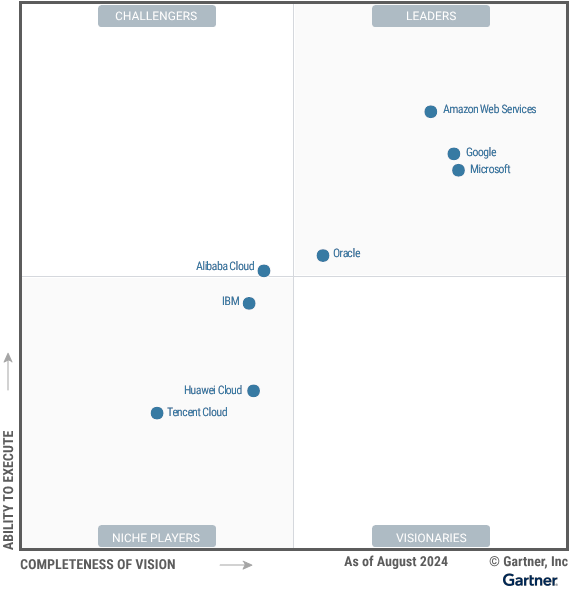Cloud computing is an ever-evolving domain where global players are not only competing for enterprise workloads but are also setting new benchmarks in AI, multicloud flexibility, and digital sovereignty. Gartner Magic Quadrant 2024 for Strategic Cloud Platform Services (SCPS) gives us a roadmap to understand which platforms excel and where there are growth opportunities.
Understanding the Gartner Magic Quadrant 2024

Gartner categorizes cloud service providers into four main groups: Leaders, Challengers, Visionaries, and Niche Players. This year’s report emphasizes the critical role these cloud platforms play in accelerating digital transformation, driving AI advancements, and improving global cloud coverage.
- Leaders: These providers excel in both execution and vision, offering comprehensive solutions for strategic cloud adoption. While strong overall, they may not excel in every specific use case.
- Challengers: Well-suited for certain needs with strong execution but limited in adapting quickly to market trends or expanding their strategic ambitions.
- Visionaries: Forward-thinking with unique tech investments but lacking in service maturity or geographical reach.
- Niche Players: Specialists in specific regions or use cases. They provide valuable services but have a narrower focus and less expansive roadmaps.
Leaders: Pioneering Cloud Services
The Leaders quadrant features dominant players who deliver high execution standards and a well-defined vision. They serve as strategic partners to enterprises, offering comprehensive solutions and shaping the future of cloud computing.
- Amazon Web Services (AWS): AWS continues to lead, providing an extensive range of IaaS and PaaS offerings with a robust global infrastructure. Known for reliability and an impressive service ecosystem, AWS is a go-to for enterprises looking for scalability and security. However, its complex service interfaces can be challenging for new users.
- Microsoft Azure: Azure stands out for its hybrid cloud capabilities, deep integration with Microsoft products, and strategic partnerships with AI leaders like OpenAI. Azure’s innovative edge in industry-specific solutions and its “better together” strategy appeal to enterprises. Despite this, Azure has faced criticism over capacity constraints in some regions and ongoing security challenges.
- Google Cloud Platform (GCP): GCP remains a frontrunner in AI/ML innovation, with the highly-rated Vertex AI platform and a focus on cloud-native technologies. Its environmental sustainability and AI-enabled services appeal to data-driven organizations. However, GCP is still playing catch-up in areas like enterprise support and legacy workload migration.
- Oracle Cloud Infrastructure (OCI): Oracle has risen to the Leaders category by delivering flexible multicloud and sovereign cloud options, appealing to enterprises needing robust integration capabilities. Its investments in AI infrastructure and collaborations with NVIDIA strengthen its position. However, OCI’s generative AI services and resilience architecture are still maturing.
Challengers: Strong Players with Growing Vision
Challengers excel at execution but still have room to enhance their strategic vision.
- Alibaba Cloud: As a major force in the Asia-Pacific region, Alibaba Cloud leads in digital commerce integrations and AI services within its domestic market. While it has an impressive partner ecosystem, its global reach is hindered by geopolitical and infrastructure challenges.
Niche Players: Specialized but Limited
Niche Players offer targeted services for specific regions or use cases but lack the scope of global hyperscalers.
- IBM Cloud: IBM leverages its strengths in hybrid cloud and enterprise-focused solutions, integrating seamlessly with Red Hat OpenShift. It appeals to regulated industries but falls short due to fragmented offerings and an incomplete edge strategy.
- Huawei Cloud: Huawei is a key player in emerging markets, utilizing its telecommunications strength to offer integrated cloud solutions. It excels in AI/ML research and has demonstrated success in high-demand enterprise environments. However, geopolitical tensions and sanctions restrict its global expansion.
- Tencent Cloud: Optimized for scalable and distributed applications, Tencent Cloud brings unique strengths in social networking integrations. However, it struggles with a limited global partner ecosystem and lacks the maturity of its global peers.
Key Trends Shaping the Strategic Cloud Platform Market
- Generative AI and Data Sovereignty: The surge in AI applications is redefining cloud strategies. Providers are investing heavily in AI/ML platforms and enhancing data sovereignty controls to meet regional regulations.
- Hybrid and Multi-Cloud Ecosystems: With increasing enterprise demand for flexibility, vendors are innovating to enable seamless cross-cloud integrations. Solutions like Azure Arc and Oracle’s multicloud database are leading the way.
- Focus on Environmental Sustainability: Companies like Google are pushing the boundaries of eco-friendly cloud operations, while others are catching up with sustainability initiatives.
- Enhanced Security and Resilience: As cyber threats evolve, cloud providers are improving security frameworks. Yet, some, like Microsoft Azure, still face scrutiny over vulnerabilities.
Strategic Considerations for Enterprises
Choosing a cloud provider is a strategic decision that can shape an organization’s digital future. Factors to weigh include data sovereignty needs, AI/ML capabilities, and the provider’s ability to support hybrid or multicloud strategies. Enterprises should engage in thorough evaluations, considering not only technological compatibility but also long-term alignment with their business goals.
Final Thoughts: As cloud technology continues to evolve, staying informed about each provider’s strengths and challenges is crucial. The Gartner Magic Quadrant serves as a guide to help businesses navigate the complexities of selecting a strategic cloud partner.
How Our Expertise Can Guide You Through the Cloud Landscape
Navigating the complex world of strategic cloud platforms can be challenging. Our company specializes in helping organizations like yours make informed cloud decisions. We provide expert guidance on selecting the right provider, optimizing cloud investments, and ensuring seamless integration with your existing infrastructure. Whether you need a tailored multicloud strategy or insights into AI/ML advancements, our team is equipped to drive your cloud journey efficiently and securely. Let us be your partner in achieving digital transformation and staying ahead in the rapidly evolving cloud ecosystem.
This analysis is based on the insights from Gartner’s Magic Quadrant for Strategic Cloud Platform Services, October 2024 (Gartner Reprint)
